|
BACKGROUND
DEFINITION OF TERMS
(For Serious Students Only)
LAMB
LAMB OF GOD
SACRIFICE
SACRIFICE AND OFFERING
I. In the Old Testament
II. In the New Testament
The
full background to this teaching is available online at this link
DEFINITION OF TERMS
|
Online links to scriptures (New International Version [NIV] unless otherwise stated) are shown in blue
| LAMB OF SACRIFICE
Daily Offerings at the Tabernacle |
|
|
| THE STORY |
|
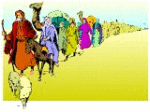 After the Israelites left Egypt they renewed their covenant with the Lord. After the Israelites left Egypt they renewed their covenant with the Lord.
Exodus 24:4b-7
|
|
|
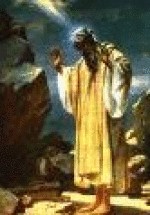 Moses was then instructed by God to go up Mt. Sinai, where he would receive the Law. Moses was then instructed by God to go up Mt. Sinai, where he would receive the Law.
Exodus 24:12-18
|
|
|
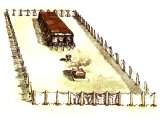 The first recorded instruction from this time (reflecting its importance) was to build the world's first church, the Tabernacle of Moses. A structure designed not only to be the focus of worship for the people of the time, but also to provide the pattern of the church still applicable today. The first recorded instruction from this time (reflecting its importance) was to build the world's first church, the Tabernacle of Moses. A structure designed not only to be the focus of worship for the people of the time, but also to provide the pattern of the church still applicable today.
Exodus 25:1-9
The Tabernacle was divided into three parts, each with a different role, or function, in the worship of God.
|
|
|
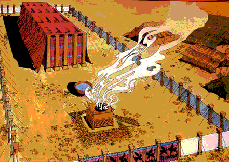 a. OUTER COURT: 'Realm of Sacrifice' (Picture of Jesus) a. OUTER COURT: 'Realm of Sacrifice' (Picture of Jesus)
In spite of the sanitised pictures we might be given, the Outer Court was a gruesome place, filled with the fear and stench of death. If you have ever been in an abattoir (slaughterhouse) you will understand how a fear of death permeates the place, which is picked up by the animals as they come in to be killed. The stench from pierced stomachs and bowels removed from the slaughtered animals adds to the gruesome horror of death by sacrifice. A vivid understanding of the cost of sin, of a life for a life, was readily understood by all those who entered.
b. HOLY PLACE: 'Realm of Worship' (Holy Spirit)
In contrast to the horror of the Outer Court was the beauty of the inside of the Tent and the golden furniture it contained. Only the Priests were allowed to enter the room. To attend to the stipulated requirements God laid down concerning how he was to be worshipped through the three items of furniture the room contained.
c. HOLY OF HOLIES: 'Realm of God's Presence' (God the Father)
The very presence of God dwelled above the 'Atonement Cover', between the wings of the two cherubim on the Ark of the Covenant. Entry into this holiest place of all was restricted to the High Priest, only on one day a year, at which time he sprinkled blood from the sacrifices before God to cover the sins of all the people of Israel.
In this study, we are specifically interested in the practices of the Outer Court, for this represented Jesus. While there were several types of offering for specific purposes, the principal one, made twice daily, morning and evening, was the sacrifice of year-old lamb.
Exodus 29:38-41
|
|
|
It was a twice-daily offering to the Lord. Yet, interestingly, the one offering that was often retained, even in days of apostasy, such as those during the time of the evil King Ahaz.
2 Kings 16:15-16
|
|
|
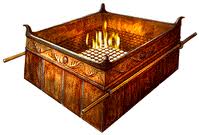 This offering was regarded as extremely important within the religious system of firstly, Israel, and then the southern kingdom of Judah. This offering was regarded as extremely important within the religious system of firstly, Israel, and then the southern kingdom of Judah.
On the Sabbath, (Saturday) the offering was doubled.
Numbers 28:9-10
Burnt, Guilt, Grain, Fellowship, and Sin Offerings supplemented these daily offerings, where appropriate. And of course, at the Religious Feasts of Passover, Weeks (Pentecost) and Tabernacles, additional sacrificial offerings were made. But the principal, twice daily offering of an unblemished lamb remained constant throughout the year.
Therefore, through the daily sacrificial system, we have another picture of the death of Jesus on the cross.
|
| SACRIFICE ON THE CROSS |
|
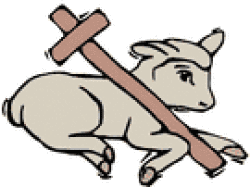 The righteous, perfect lamb Jesus, died for all those who will believe in order that we may be restored into relationship with the Father. The righteous, perfect lamb Jesus, died for all those who will believe in order that we may be restored into relationship with the Father.
Romans 3:21-6
|
|
|
 Unlike the daily Tabernacle and Temple sacrifices required for the forgiveness of ongoing sin, Jesus died just the once as a sacrifice for all sin. Unlike the daily Tabernacle and Temple sacrifices required for the forgiveness of ongoing sin, Jesus died just the once as a sacrifice for all sin.
Hebrews 9:26
|
|
|
For He understood that God was not happy with animal offerings.
Hebrews 10:5-7
|
|
|
As the final sacrifice for our sin, He defends us before the Father.
1 John 2:1-2
|
| OUR RESPONSE |
|
 Through this New Covenant (Testament) of the sacrifice of Jesus on the cross, He made us 'positionally' perfect, positionally holy. Through this New Covenant (Testament) of the sacrifice of Jesus on the cross, He made us 'positionally' perfect, positionally holy.
Hebrews 10:8-14
|
|
|
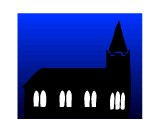 The problem we have in much of the church is, we use the final sacrifice of Jesus as an excuse to go on sinning. Once forgiven, always forgiven. So it doesn't matter how we live! The problem we have in much of the church is, we use the final sacrifice of Jesus as an excuse to go on sinning. Once forgiven, always forgiven. So it doesn't matter how we live!
This is so far from the truth as to be 'criminal'. We are told to imitate Jesus. As He was a sacrifice for us, so we need to sacrifice our fleshly desires for Him. For holiness needs to be worked out in our lives 'experientially'.
Ephesians 5:1-14
|
|
|
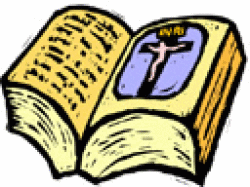 Righteous living is to be our response to the sacrifice Jesus made for us. As followers of Jesus we are to meet together, love each other and do good deeds. Righteous living is to be our response to the sacrifice Jesus made for us. As followers of Jesus we are to meet together, love each other and do good deeds.
If we don't, the consequences are dire. We will be judged and consigned to the raging fire along with all the others who have chosen to go their own way. This is not David Tait being condemnatory, but the Word of God!
Hebrews 10:19-27
|
|
|
Accompanied by the sacrifices of worship, goodness and sharing.
Hebrews 13:15-16
|
|
|
As the Father loved us enough to send Jesus, as Jesus loved us enough to die for us, so we are to love others with sacrificial love.
1 John 4:8-12
|
|
|
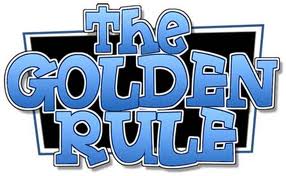 Yes, our response to the sacrifice of Jesus is to return the complement of love shown to us, back to God and to others, to apply the 'Golden Rule' in our lives. Yes, our response to the sacrifice of Jesus is to return the complement of love shown to us, back to God and to others, to apply the 'Golden Rule' in our lives.
Matthew 22:27-8
|
| <i>NEXT WEEK</i> A REVELATION OF...
THE SEVEN REVELATIONS OF THE LAMB - Part 5 |
|
 The coming of the 'Lamb of God' Himself was, and remains, the pivotal point in history. The coming of the 'Lamb of God' Himself was, and remains, the pivotal point in history.
Without the death and resurrection of Jesus we would be completely without comfort in a human centred world.
|
| A NOTE FROM DAVID |
|
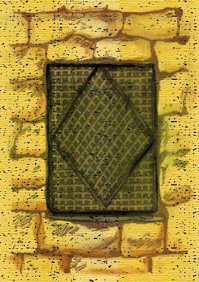 We can talk as much as we like about what Jesus has done for us but if we don't live a righteous life all the talk is worthless! We can talk as much as we like about what Jesus has done for us but if we don't live a righteous life all the talk is worthless!
We need to move away from the Greek thought process of separation of thoughts and actions and move to a Jewish perspective where thoughts and actions are integrated, one with the other. Saying one thing and doing another is simply not acceptable.
ANCIENT LATTICE WINDOW
The lattice window looked very much like a fisherman's net, and was used in warm middle eastern countries. It was formed of reticulated work, and highly ornamental. They also had hinges which allowed them to be open or shut. On very hot days then sun is kept out while the air is let in through the trellis openings.
So8urce: http://www.bible-history.com
|
So until next week.......
MAY GOD BLESS YOU AND YOU BLESS GOD!
His servant and yours
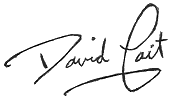
Learn more about us at...
www.wwj.org.nz/about.php
|
A DAVID'S DOODLING
1089. Character to a Christian is as water to a ship. Without it we are left high and dry!
David Tait
|
Check
out the WWJ website for….
More David's Doodlings: www.wwj.org.nz/dd.php
PGIM! Weekly Encouragement Ezine�: http://www.wwj.org.nz/wwword.php
Reports on past Ministry visits: http://www.wwj.org.nz/diary.php
Eagles Fly High!: http://www.wwj.org.nz/eagle.php
Eagles Fly High! (Pastors, Teachers and Students): http://www.wwj.org.nz/eaglepts.php
|

 After the Israelites left Egypt they renewed their covenant with the Lord.
After the Israelites left Egypt they renewed their covenant with the Lord.  Moses was then instructed by God to go up Mt. Sinai, where he would receive the Law.
Moses was then instructed by God to go up Mt. Sinai, where he would receive the Law.  The first recorded instruction from this time (reflecting its importance) was to build the world's first church, the Tabernacle of Moses. A structure designed not only to be the focus of worship for the people of the time, but also to provide the pattern of the church still applicable today.
The first recorded instruction from this time (reflecting its importance) was to build the world's first church, the Tabernacle of Moses. A structure designed not only to be the focus of worship for the people of the time, but also to provide the pattern of the church still applicable today.  a. OUTER COURT: 'Realm of Sacrifice' (Picture of Jesus)
a. OUTER COURT: 'Realm of Sacrifice' (Picture of Jesus) This offering was regarded as extremely important within the religious system of firstly, Israel, and then the southern kingdom of Judah.
This offering was regarded as extremely important within the religious system of firstly, Israel, and then the southern kingdom of Judah.  The righteous, perfect lamb Jesus, died for all those who will believe in order that we may be restored into relationship with the Father.
The righteous, perfect lamb Jesus, died for all those who will believe in order that we may be restored into relationship with the Father.  Unlike the daily Tabernacle and Temple sacrifices required for the forgiveness of ongoing sin, Jesus died just the once as a sacrifice for all sin.
Unlike the daily Tabernacle and Temple sacrifices required for the forgiveness of ongoing sin, Jesus died just the once as a sacrifice for all sin.  Through this New Covenant (Testament) of the sacrifice of Jesus on the cross, He made us 'positionally' perfect, positionally holy.
Through this New Covenant (Testament) of the sacrifice of Jesus on the cross, He made us 'positionally' perfect, positionally holy.  The problem we have in much of the church is, we use the final sacrifice of Jesus as an excuse to go on sinning. Once forgiven, always forgiven. So it doesn't matter how we live!
The problem we have in much of the church is, we use the final sacrifice of Jesus as an excuse to go on sinning. Once forgiven, always forgiven. So it doesn't matter how we live!  Righteous living is to be our response to the sacrifice Jesus made for us. As followers of Jesus we are to meet together, love each other and do good deeds.
Righteous living is to be our response to the sacrifice Jesus made for us. As followers of Jesus we are to meet together, love each other and do good deeds.  Yes, our response to the sacrifice of Jesus is to return the complement of love shown to us, back to God and to others, to apply the 'Golden Rule' in our lives.
Yes, our response to the sacrifice of Jesus is to return the complement of love shown to us, back to God and to others, to apply the 'Golden Rule' in our lives.  The coming of the 'Lamb of God' Himself was, and remains, the pivotal point in history.
The coming of the 'Lamb of God' Himself was, and remains, the pivotal point in history.  We can talk as much as we like about what Jesus has done for us but if we don't live a righteous life all the talk is worthless!
We can talk as much as we like about what Jesus has done for us but if we don't live a righteous life all the talk is worthless!